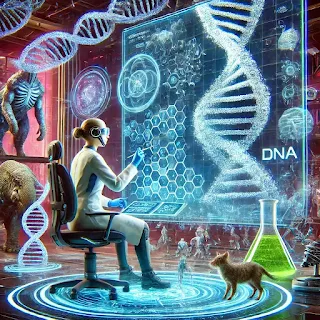Introduction
The gaming industry is constantly evolving, drawing inspiration from various fields, including science, history, and technology. One emerging trend is the rise of biotech-inspired game themes, which blend elements of biotechnology, genetic engineering, and futuristic biological advancements into immersive gaming experiences. With growing public interest in biotechnology due to breakthroughs in CRISPR, synthetic biology, and medical advancements, developers are now leveraging these themes to create engaging and thought-provoking games.
This article explores why biotech-inspired games are trending, their impact on players, notable examples, and how game developers can incorporate biotech themes to enhance storytelling and gameplay.
Why Biotech-Inspired Games Are Gaining Popularity
Biotechnology, once a niche topic confined to laboratories, is now at the forefront of global discussions. Games inspired by biotech themes resonate with players for several reasons:
1. Real-World Relevance
Advancements in genetic modification, cloning, and biohacking have made biotech a hot topic in science and ethics.
Players find biotech-based narratives intriguing because they reflect real-world possibilities and dilemmas.
2. The Fusion of Science and Fiction
Biotech themes allow developers to create futuristic, dystopian, or utopian worlds where scientific experimentation has transformed humanity.
The blend of reality and fiction enhances immersion, making players question the ethical and moral implications of biotechnological advancements.
3. Engaging Storytelling and Deep Moral Dilemmas
Biotech narratives often explore questions about human augmentation, DNA manipulation, and the boundaries of scientific intervention.
These themes add depth to storytelling, encouraging players to make difficult choices that impact the game world.
4. The Popularity of Science-Based Media
Films, TV shows, and books centered on biotechnology (e.g., Jurassic Park, Gattaca, Altered Carbon) have gained massive popularity.
Video games are now adopting these themes to attract a growing audience interested in scientific storytelling.
Biotech-Inspired Games:
Notable Examples Several games have already explored biotech-related themes, demonstrating the potential for engaging gameplay and storytelling.
1. Deus Ex Series
A cyberpunk RPG that explores human augmentation, genetic modifications, and biotech advancements.
Players navigate a world where cybernetic enhancements create societal divides and ethical dilemmas.
2. Bioshock Series
Features genetic modifications called “Plasmids” that give players supernatural abilities.
Explores the consequences of unchecked scientific experimentation and the ethical downfall of a utopian society.
3. Prey (2017)
Introduces alien-derived biotech that allows players to acquire extraordinary abilities.
Raises questions about the ethics of human experimentation and the risks of advanced genetic research.
4. Horizon Zero Dawn
Combines biotechnology with artificial intelligence to create a world where machines mimic biological life forms.
Highlights the unintended consequences of biotech advancements gone wrong.
5. Plague Inc.
A strategy game where players design and evolve a pathogen to infect the world.
Offers an educational perspective on disease spread, viral mutations, and epidemiology.
6. Resident Evil Series
Focuses on biotech experiments that lead to viral outbreaks, mutations, and bioengineered horrors.
Explores corporate greed, unethical scientific experiments, and bioterrorism.
How Game Developers Can Integrate Biotech Themes
As biotech continues to evolve, game developers can creatively incorporate these elements to create immersive and thought-provoking experiences.
1. Scientific Accuracy with Creative Freedom
Developers should balance scientific realism with engaging gameplay mechanics.
Collaborating with biologists and geneticists can enhance authenticity.
2. Ethical Decision-Making Mechanics
Games can include choices where players must decide between scientific progress and ethical boundaries.
Example: Choosing whether to enhance a character’s abilities through risky gene editing.
3. Dynamic Evolution and Adaptation Systems
Introducing in-game mechanics where characters or environments evolve over time based on biotech influences.
Example: A game where mutations allow characters to develop new abilities but come with side effects.
4. AI and Biohybrid Integration
Exploring the convergence of AI and biotechnology, such as bioengineered machines or AI-driven genetic manipulation.
Example: A futuristic RPG where AI assists in medical biotechnology advancements but raises ethical concerns.
5. Survival and Resource Management
Games can incorporate biotech elements into survival mechanics, where players must manage genetically modified crops, engineered viruses, or synthetic organs.
Example: A post-apocalyptic game where players must craft bio-enhancements to adapt to a changing world.
6. Multiplayer and Cooperative Biotech Challenges
Cooperative gameplay where players work together to solve biotech-related puzzles or create genetic solutions to in-game crises.
Example: A team-based strategy game where players must develop a cure for an evolving in-game pathogen.
The Future of Biotech-Inspired Games
As scientific advancements continue to shape our world, biotech-inspired games have the potential to:
Increase awareness and understanding of genetic engineering and biotechnology.
Spark ethical discussions about the impact of biotech on humanity.
Inspire future scientists and researchers through interactive storytelling.
Push the boundaries of game design by integrating real-world scientific principles.
Potential Trends in Biotech Gaming
Augmented Reality (AR) & Virtual Reality (VR) Experiences: Biotech-themed VR simulations where players conduct genetic experiments.
AI-Driven Storytelling: Games that adapt narratives based on player choices in biotech research.
Educational Gaming: Interactive biotech learning experiences for students and science enthusiasts.
Real-World Integration: Games that incorporate real-world biotech data to create evolving gameplay mechanics.
Conclusion
Biotech-inspired game themes are emerging as a significant trend in the gaming industry. With their ability to blend scientific reality with engaging storytelling, these games offer players both entertainment and intellectual stimulation. By integrating ethical dilemmas, real-world scientific advancements, and dynamic gameplay mechanics, developers can create biotech-themed experiences that captivate gamers and spark meaningful discussions.
As biotechnology continues to evolve, the gaming world has an opportunity to explore its implications in ways that are both thought-provoking and entertaining. Whether through dystopian futures, scientific exploration, or bioengineered survival scenarios, the fusion of biotech and gaming is set to redefine interactive entertainment in the years to come.

No comments:
Post a Comment